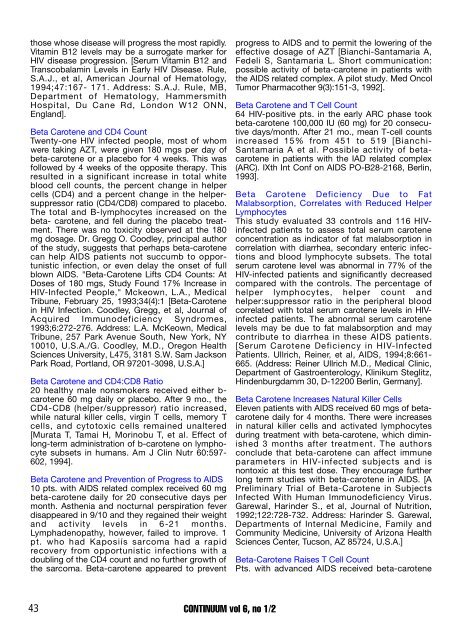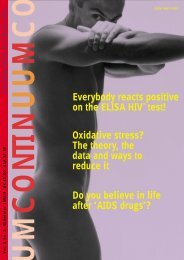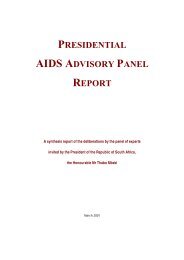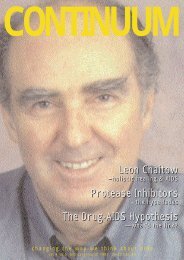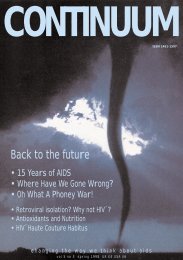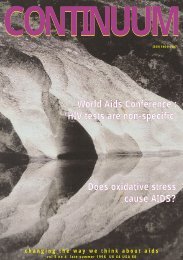AIDS post-HIV : beat of a different drummer - AltHeal
AIDS post-HIV : beat of a different drummer - AltHeal
AIDS post-HIV : beat of a different drummer - AltHeal
You also want an ePaper? Increase the reach of your titles
YUMPU automatically turns print PDFs into web optimized ePapers that Google loves.
those whose disease will progress the most rapidly.<br />
Vitamin B12 levels may be a surrogate marker for<br />
<strong>HIV</strong> disease progression. [Serum Vitamin B12 and<br />
Transcobalamin Levels in Early <strong>HIV</strong> Disease. Rule,<br />
S.A.J., et al, American Journal <strong>of</strong> Hematology,<br />
1994;47:167- 171. Address: S.A.J. Rule, MB,<br />
Department <strong>of</strong> Hematology, Hammersmith<br />
Hospital, Du Cane Rd, London W12 ONN,<br />
England].<br />
Beta Carotene and CD4 Count<br />
Twenty-one <strong>HIV</strong> infected people, most <strong>of</strong> whom<br />
w e re taking AZT, were given 180 mgs per day <strong>of</strong><br />
beta-carotene or a placebo for 4 weeks. This was<br />
followed by 4 weeks <strong>of</strong> the opposite therapy. This<br />
resulted in a significant increase in total white<br />
blood cell counts, the percent change in helper<br />
cells (CD4) and a percent change in the helpersuppressor<br />
ratio (CD4/CD8) compared to placebo.<br />
The total and B-lymphocytes increased on the<br />
beta- carotene, and fell during the placebo tre a t-<br />
ment. There was no toxicity observed at the 180<br />
mg dosage. Dr. Gregg O. Coodley, principal author<br />
<strong>of</strong> the study, suggests that perhaps beta-carotene<br />
can help <strong>AIDS</strong> patients not succumb to opportunistic<br />
infection, or even delay the onset <strong>of</strong> full<br />
blown <strong>AIDS</strong>. "Beta-Carotene Lifts CD4 Counts: At<br />
Doses <strong>of</strong> 180 mgs, Study Found 17% Increase in<br />
H I V-Infected People," Mckeown, L.A., Medical<br />
Tribune, February 25, 1993;34(4):1 [Beta-Caro t e n e<br />
in <strong>HIV</strong> Infection. Coodley, Gregg, et al, Journal <strong>of</strong><br />
A c q u i red Immunodeficiency Syndro m e s ,<br />
1993;6:272-276. Address: L.A. McKeown, Medical<br />
Tribune, 257 Park Avenue South, New York, NY<br />
10010, U.S.A./G. Coodley, M.D., Oregon Health<br />
Sciences University, L475, 3181 S.W. Sam Jackson<br />
Park Road, Portland, OR 97201-3098, U.S.A.]<br />
Beta Carotene and CD4:CD8 Ratio<br />
20 healthy male nonsmokers received either b-<br />
carotene 60 mg daily or placebo. After 9 mo., the<br />
CD4-CD8 (helper/suppressor) ratio incre a s e d ,<br />
while natural killer cells, virgin T cells, memory T<br />
cells, and cytotoxic cells remained unaltere d<br />
[Murata T, Tamai H, Morinobu T, et al. Effect <strong>of</strong><br />
long-term administration <strong>of</strong> b-carotene on lymphocyte<br />
subsets in humans. Am J Clin Nutr 60:597-<br />
602, 1994].<br />
Beta Carotene and Prevention <strong>of</strong> Progress to <strong>AIDS</strong><br />
10 pts. with <strong>AIDS</strong> related complex received 60 mg<br />
b e t a - c a rotene daily for 20 consecutive days per<br />
month. Asthenia and nocturnal perspiration fever<br />
disappeared in 9/10 and they regained their weight<br />
and activity levels in 6-21 months.<br />
Ly m p h a d e n o p a t h y, however, failed to improve. 1<br />
pt. who had Kaposiís sarcoma had a rapid<br />
recovery from opportunistic infections with a<br />
doubling <strong>of</strong> the CD4 count and no further growth <strong>of</strong><br />
the sarcoma. Beta-carotene appeared to pre v e n t<br />
progress to <strong>AIDS</strong> and to permit the lowering <strong>of</strong> the<br />
e ffective dosage <strong>of</strong> AZT [Bianchi-Santamaria A,<br />
Fedeli S, Santamaria L. Short communication:<br />
possible activity <strong>of</strong> beta-carotene in patients with<br />
the <strong>AIDS</strong> related complex. A pilot study. Med Oncol<br />
Tumor Pharmacother 9(3):151-3, 1992].<br />
Beta Carotene and T Cell Count<br />
64 <strong>HIV</strong>-positive pts. in the early ARC phase took<br />
beta-carotene 100,000 IU (60 mg) for 20 consecutive<br />
days/month. After 21 mo., mean T-cell counts<br />
i n c reased 15% from 451 to 519 [Bianchi-<br />
Santamaria A et al. Possible activity <strong>of</strong> betac<br />
a rotene in patients with the IAD related complex<br />
(ARC). IXth Int Conf on <strong>AIDS</strong> PO-B28-2168, Berlin,<br />
1993].<br />
Beta Carotene Deficiency Due to Fat<br />
Malabsorption, Correlates with Reduced Helper<br />
Lymphocytes<br />
This study evaluated 33 controls and 116 <strong>HIV</strong>infected<br />
patients to assess total serum caro t e n e<br />
concentration as indicator <strong>of</strong> fat malabsorption in<br />
c o r relation with diarrhea, secondary enteric infections<br />
and blood lymphocyte subsets. The total<br />
serum carotene level was abnormal in 77% <strong>of</strong> the<br />
H I V-infected patients and significantly decre a s e d<br />
c o m p a red with the controls. The percentage <strong>of</strong><br />
helper lymphocytes, helper count and<br />
h e l p e r : s u p p ressor ratio in the peripheral blood<br />
correlated with total serum carotene levels in <strong>HIV</strong>infected<br />
patients. The abnormal serum caro t e n e<br />
levels may be due to fat malabsorption and may<br />
contribute to diarrhea in these <strong>AIDS</strong> patients.<br />
[Serum Carotene Deficiency in <strong>HIV</strong>- I n f e c t e d<br />
Patients. Ullrich, Reiner, et al, <strong>AIDS</strong>, 1994;8:661-<br />
665. (Address: Reiner Ullrich M.D., Medical Clinic,<br />
Department <strong>of</strong> Gastroenterology, Klinikum Steglitz,<br />
Hindenburgdamm 30, D-12200 Berlin, Germany].<br />
Beta Carotene Increases Natural Killer Cells<br />
Eleven patients with <strong>AIDS</strong> received 60 mgs <strong>of</strong> betacarotene<br />
daily for 4 months. There were increases<br />
in natural killer cells and activated lymphocytes<br />
during treatment with beta-carotene, which diminished<br />
3 months after treatment. The authors<br />
conclude that beta-carotene can affect immune<br />
parameters in <strong>HIV</strong>-infected subjects and is<br />
nontoxic at this test dose. They encourage further<br />
long term studies with beta-carotene in <strong>AIDS</strong>. [A<br />
P reliminary Trial <strong>of</strong> Beta-Carotene in Subjects<br />
Infected With Human Immunodeficiency Vi r u s .<br />
G a rewal, Harinder S., et al, Journal <strong>of</strong> Nutrition,<br />
1992;122:728-732. Address: Harinder S. Gare w a l ,<br />
Departments <strong>of</strong> Internal Medicine, Family and<br />
Community Medicine, University <strong>of</strong> Arizona Health<br />
Sciences Center, Tucson, AZ 85724, U.S.A.]<br />
Beta-Carotene Raises T Cell Count<br />
Pts. with advanced <strong>AIDS</strong> received beta-caro t e n e<br />
43<br />
CONTINUUM vol 6, no 1/2


